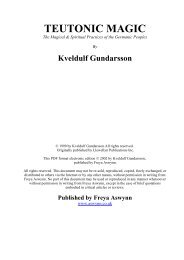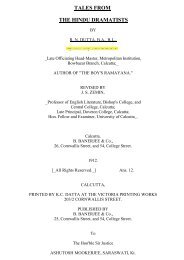Untitled - Awaken Video
Untitled - Awaken Video
Untitled - Awaken Video
Create successful ePaper yourself
Turn your PDF publications into a flip-book with our unique Google optimized e-Paper software.
Chapter 8. The Making of a Seiðman 210<br />
8.3. The Quick Dead:<br />
Early on I noticed how crowded graveyards seemed to be. I could walk into a<br />
graveyard and the place would be almost the deafening. Sometimes the ghosts would<br />
want my attention because flowers were tipped over at the gravesite sometimes they<br />
wished only to greet me. I’ve seen happy ghosts, sad ones, and disturbed ones. One<br />
time I entered a graveyard in southwest Virginia and the ghosts were all bickering<br />
with one another and gossiping (this was not a fun graveyard to be in).<br />
I was curious from the outset why graveyards seemed to be so populated if the<br />
dead supposedly moved on to a Land of the Dead. It seemed odd that Christians<br />
were not in either Heaven or Hell. In working with the sick it is common for me to<br />
encounter entire towns of the dead but still I notice that the graveyards seemed to be<br />
full. This was explained me this way: The dead do not go to either Heaven or Hell<br />
rather they go to villages of their ancestors. These villages never seem full mainly<br />
because space in time are severely distorted in the other world. The graveyard, or<br />
specifically the grave, is an entry point to the village of the dead. It is also the point<br />
where the Flow of Waters occurs. An individual’s ancestral luck flows from the grave<br />
of his family or his most immediate ancestor. By caring for grave of an immediate<br />
ancestor an individual is grooming the pathway through which the Waters flow. If<br />
this is neglected, particularly in a malicious way, the flow of ancestral luck can be<br />
stopped. If the individual is low in the area of personal luck, he will become ill. The<br />
grave then is the connecting point between this world and the other world.<br />
Catholics and other Christians have a tendency to call their particular ancestral<br />
village "Heaven." "Hell" is created for an individual when he is ostracized by his<br />
ancestral village and is driven out into the Wasteland. This place, I suppose, can feel<br />
either hot or cold but is certainly uncomfortable for the individual mainly because<br />
they’re not in the fold of their ancestors. The same holds true for heathens as well.<br />
I always wanted to believe that heathens would somehow be different than Christians<br />
and that we have a better place to go to after death, but the bottom-line seems<br />
to be that we simply go to our ancestral home regardless of our religious affiliations.<br />
By the way, from what I can see, the dead worship in the same fashion as the living.<br />
Christians go to churches, and I would guess that heathens wind up worshiping alone<br />
as they often do here on Midgard (heathens, as a group, are too small to really have<br />
something like a church). I have to smile to myself when I hear heathens say “I am<br />
going to Asgard when I die” or “I am going to Thrundheim after death.” As far as I<br />
can tell, we really do just go to our graves and from there go to our ancestral homes<br />
(or to the Wasteland if we are jerks and wind up being ostracized). In life, I guess<br />
many people have to make themselves feel somewhat ‘special’ by bragging that they<br />
are going to sit at the right hand of their personal King after death.<br />
As I stated earlier, I work in the medical field. For a period of about five
















